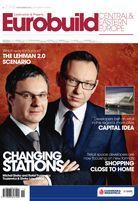Take a deep breath and relax. The Lehman 2.0 scenario is most likely... not going to happen, according to Andreas Rees, chief German economist at UniCredit in Munich. He is also the keynote speaker at our upcoming 17th Annual Construction and Property Conference, where he will be discussing the challenges on the bumpy road to recovery. Talking about the euro debt crisis is the inescapable thing to do, but given the current consternation and pending policy responses in the short-term, any answers could easily be out of date before going to print. Instead we focused on another hot issue - is the German economy heading for an economic slowdown and how the challenges in front of the EU's largest economy are likely to effect the neighbouring CEE economies dependent upon it
Mladen Petrov, Eurobuild CEE: It's happening, isn't it? The German economy is slowing down.Andreas Rees, chief German economist at UniCredit: There's no denying that a significant growth slowdown in the German economy




























































